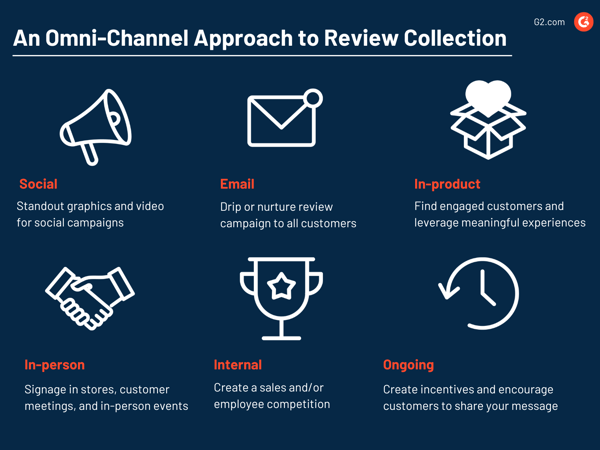June 7, 2023
 by Stephen Hoops / June 7, 2023
by Stephen Hoops / June 7, 2023

Word of mouth is just as important today as it was to buyers centuries ago.
We’re more connected than ever, and we have access to insights and experiences of countless people we’ll likely never meet in person or develop personal connections with. Online reviews have become a crucial component of the buyer’s journey, essentially becoming word of mouth on a grander scale.
In honor of the first annual National Leave a Review Day on June 8th, Chief Marketing Officer Liz Carter of Reputation and Senior Director of Product Management Rachel Bentley of G2 came together to discuss the growing importance of online reviews in a recent webinar. If you didn’t get a chance to catch it, this article will recap some of their expert insights and provide some actionable tips to ramp up review collection.
If you’re reading this, there’s a good chance you’ve made an online purchase in the last year. It’s hard to ignore how customer reviews have become synonymous with the online shopping experience.
Reviews extend beyond just consumer products. From travel to healthcare, dining to software, and countless others, buyers and consumers now rely on reviews to help them in their decision-making process. Because of this, businesses should view customer feedback as a precious resource.
“Reviews can be the lifeblood of a marketing organization. You're trying to get in front of more customers every day. Reviews actually allow you to do that.”
Liz Carter
Chief Marketing Officer, Reputation
When you buy something online, you expect the product to work. That decision to buy is an initial leap of faith because no one wants to waste time or have unmet expectations.
Reviews are much more than helping buyers set expectations. Let’s examine four specific ways that demonstrate how they’re valuable for buyers and companies.
One of the best ways reviewers can help prospective buyers is to provide as much information and context as possible. In-depth reviews can help educate buyers about concepts and considerations they wouldn’t have thought of before.
During the webinar, Rachel Bentley of G2 shared a personal experience where she was on the search for a new refrigerator. She noticed that several reviews mentioned whether fridges were noisy or silent. Before reading these reviews, she wasn't looking for a fridge’s noise output.
Rachel’s experience is a great demonstration of how reviews can educate buyers about what they’re buying. Well-informed customers know what they want, which can lead to more positive purchasing experiences.
Every business should care about a customer’s experience. Customer reviews are often unbiased, honest feedback that aids in judging overall sentiment but is also valuable for revealing improvement opportunities.
Liz Carter shared a story about a customer from the U.K. in the hospitality industry. This customer received reviews criticizing the tomatoes on one of their sandwiches.
Based on these negative reviews, the company removed the tomato from this sandwich. By making one change, the company reported the following results:
When buyers can’t rely on the experiences of close friends, relatives, or business colleagues, they will often turn to online search engines to find products and services. Search engines like Google and Bing appreciate how valuable reviews can be for their users, which is why you’ll commonly see results showing reviews from numerous sources.
Reviews can help businesses achieve greater visibility among their target audiences, almost regardless of industry or vertical.
One of the most significant reasons buyers depend on reviews is because they boost their overall confidence. As referenced earlier, reviews can be your most persuasive tool to prove why your offering is best suited for your buyers by learning from previous customers' experiences.
"Reviews help buyers have more confidence purchase decisions and ensure they're finding the right match."
Rachel Bentley
Sr. Director of Product Management, G2
The more a buyer is likely to spend on a product or service, the more likely they are to need additional information to assist them in making an educated decision. This is especially true in industries such as healthcare and B2B software, where there is more at stake due to higher associated costs.
Reviews can have a genuine impact on businesses looking to attract new customers. Companies may understand the importance of reviews, but many don’t embrace them in practice. Experts Rachel Bentley and Liz Carter shared advice to get the most out of reviews and begin ramping up collection.
Many customers are willing to leave reviews. All they need is a nudge of encouragement.
Liz shared a fascinating case study examining their customer Intermountain Health. This integrated health system with locations across several states faced the challenge of having lower ratings in online searches.
The solution was implementing a new plan to increase review requests and allot more resources to review replies to improve online visibility. The results of these efforts include:
Volume is an important aspect of reviews because buyers gain a complete picture of the experiences of others. We all have differing opinions, and more reviews provide a more accurate way to form their expectations.
There are many different ways to collect reviews. One tip to keep in mind when ramping up review collection is to think of different ways to deliver the ask to customers.
For example, you may find a lot of success in sending automated email requests to submit reviews. But consider that some customers respond more positively when prompted in person or on social media.

Another component that makes reviews more meaningful to potential buyers is recency. Did you know that 85% of buyers don’t read reviews older than three months?
A review from three years ago isn’t as relevant as one written a month ago. A company can undergo dramatic changes over the course of several years, so recency plays a big part in a buyer’s analysis. The reality is that collecting reviews is not a one-and-done motion – it has to happen continuously.
Truckstop saw a 150% increase in monthly leads. Learn how the Pendo + G2 integration helped them do it by automating review collection with in-app prompts.
Chasing perfection when it comes to reviews is a common mistake companies make. It can be unnerving to accept that not every review will be positive.
Many businesses may not realize that embracing reviews – good and bad – helps establish credibility and makes them authentic. According to a study by Northwestern University, consumers view companies with a 4.2 to 4.5-star rating as more trustworthy than a perfect 5-star score.
It can be daunting to ask for more reviews because you don’t have as much control over what’s coming in. While positive reviews can be monumental in winning over buyers, there’s value in all the reviews you receive.
By favoring real, authentic reviews from your customers, companies can expect to reap several of the following benefits:
June 8, 2023, marks the first official observance of National Leave a Review Day. This day is all about bringing awareness to the importance of what Liz Carter refers to as the “feedback economy.”
“You need to understand the voice of the customer to run your business,” says Liz. “Reviews play a huge role in that.”
Whether you’re excited about the first National Leave a Review Day or starting to think about how to plan for next year, let’s explore some key insights shared by G2 + Reputation.
Ready to take things to the next level with your review management strategy on G2? Enroll in G2 University and hit the books to learn best practices and actionable tips.
Stephen Hoops is a former Sr. Content Marketing Specialist at G2. He focused on creating content that helps tech industry sales professionals and B2B SaaS marketers find success with G2 products such as Buyer Intent, Review Generation, and more. After receiving his B.A. in Journalism from West Virginia University in 2013, he has helped countless B2B brands reach new highs through content creation and SEO. When not nerding out about the artistry behind well-written copy, Stephen can be found info-dumping about homemade cocktails, Italian cuisine, and why vinyl is the superior physical medium for music.
In case you haven’t heard, reviews are all the rage.
 by Kristen McCabe
by Kristen McCabe
Buckle up, Speed Racer. The software world moves so fast that it’ll make your head spin.
 by Stephen Hoops
by Stephen Hoops
Optimism and hope are two of the most powerful qualities humans possess.
 by Stephen Hoops
by Stephen Hoops
In case you haven’t heard, reviews are all the rage.
 by Kristen McCabe
by Kristen McCabe
Buckle up, Speed Racer. The software world moves so fast that it’ll make your head spin.
 by Stephen Hoops
by Stephen Hoops


